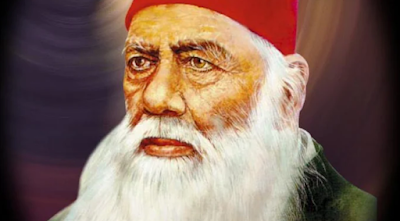Allama Iqbal
**Allama Iqbal: The Visionary Poet and Philosopher**
**Introduction**
Allama Muhammad Iqbal, known as the "Spiritual Father of Pakistan," is one of the most influential figures in modern South Asian history. His poetry and philosophy have left an indelible mark on the intellectual and political landscape of the region. Born on November 9, 1877, in Sialkot, British India (now Pakistan), Iqbal’s contributions span across literature, philosophy, and political thought. His life and work remain a source of inspiration and reflection for scholars, poets, and politicians alike.
**Early Life and Education**
Iqbal’s early education in Sialkot laid the foundation for his future intellectual pursuits. He studied at Government College, Lahore, where he was exposed to classical literature and philosophy. His quest for knowledge led him to Europe, where he pursued higher studies in philosophy. Iqbal earned his doctorate from the University of Munich, Germany, with a thesis on the development of metaphysics in Persia. This period was crucial in shaping his philosophical outlook and poetic style.
**Philosophical Contributions**
Iqbal’s philosophy is often described as a blend of Eastern and Western thought, characterized by a profound understanding of Islamic philosophy and a critical engagement with European ideas. His work revolves around the concept of Khudi, or selfhood, which emphasizes the importance of self-realization and the dynamic nature of the human spirit. Iqbal’s philosophy advocates for the rejuvenation of the individual and the collective spirit, stressing that a vibrant and dynamic society requires the development of a strong sense of self.
One of his key philosophical contributions is the concept of "Reconstruction of Religious Thought," wherein he sought to reinterpret Islamic teachings in the context of modernity. Iqbal argued for a progressive and dynamic understanding of Islam, which could engage with contemporary scientific and philosophical ideas without losing its core essence. His emphasis on the compatibility of faith and reason was instrumental in reshaping Islamic thought in the early 20th century.
**Poetic Legacy**
Iqbal’s poetry is renowned for its depth, complexity, and lyrical beauty. Written in Persian and Urdu, his verses address themes of selfhood, spirituality, and social justice. His poetry reflects his philosophical ideas and his vision for an awakened and empowered Muslim community. In his Urdu collection "Bang-e-Dra" ("The Call of the Marching Bell"), Iqbal’s verses resonate with calls for awakening and mobilization, blending mystical insight with a call for social and political change.
Iqbal’s Persian poetry, particularly in works like "Asrar-e-Khudi" ("Secrets of the Self") and "Rumuz-i-Bekhudi" ("The Secrets of Selflessness"), explores the inner dimensions of the self and its relationship with the Divine. These works underscore his belief in the importance of self-identity and the role of personal and collective struggle in achieving spiritual and social goals.
**Political Vision**
Iqbal’s political vision was profoundly shaped by his philosophical and poetic reflections. He is credited with articulating the concept of a separate Muslim state, which eventually led to the creation of Pakistan in 1947. His address at the annual session of the All-India Muslim League in 1930 is often seen as a defining moment in the call for a separate Muslim homeland. Iqbal envisioned a state where Islamic principles could be implemented in a modern context, ensuring both social justice and political sovereignty.
Despite his significant role in the movement for Pakistan, Iqbal's vision was not limited to political boundaries. He envisioned a broader unity among Muslim nations and advocated for a renaissance of Islamic civilization. His political thought was deeply intertwined with his philosophical and poetic ideals, aiming for a holistic transformation of society.
**Legacy and Influence**
Allama Iqbal's legacy endures through his extensive body of work and the profound impact he has had on subsequent generations. His philosophical insights continue to influence contemporary discussions on Islamic thought and modernity. His poetry remains a source of inspiration for millions, celebrated for its emotional depth and intellectual rigor.
In Pakistan, Iqbal is honored as a national hero and a symbol of intellectual and spiritual leadership. His birthday, November 9, is celebrated as Iqbal Day, reflecting the nation’s recognition of his contributions to its identity and values.
**Conclusion**
Allama Iqbal's life and work represent a remarkable fusion of intellectual, spiritual, and political dimensions. His contributions to philosophy, poetry, and political thought have left an enduring legacy that transcends borders and generations. Iqbal's vision of an empowered self and a dynamic society continues to inspire and challenge us, making his work as relevant today as it was in his own time. His enduring influence is a testament to the power of thought and the profound impact of visionary leadership.



Comments
Post a Comment